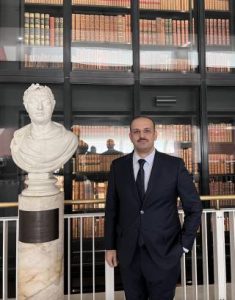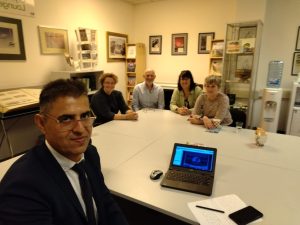A visit to Iraq: Planning for the future
By Mehiyar Kathem, on 6 December 2022
On our trip to Iraq last month, we had noticed that most of the passengers arriving at Baghdad International Airport were pilgrims intending to visit the shrine of Sufi founder Abdul Qadir al-Gailani. Knowing that the next few days would be made up of formal meetings, we decided to take the opportunity to visit on that evening the shrine in central Baghdad.
Pilgrims from Iraq, India, Pakistan, Bangladesh, UK and South Africa and other countries had come to worship and contribute to the spirit of a shared and global Sufi community. As a central meeting point for Sufi Muslims, the Shrine of Abdul Qadir al-Gailani fused devotion and religious practice – commonly with poetry, song and chanting – with a fervour of celebration and on the main courtyard, one could experience the uniqueness of that cultural and social mergence.

The shrine of Abdul Qadir al-Gailani
Professor Eleanor and I also met with the new Minister of Culture, Tourism and Antiquities, Dr Ahmed Fakak al-Badrani. Dr al-Badrani had previously been a lecturer at the University of Mosul, specialised in the political history of Iraq. The meeting was attended by Dr Laith Hussein, Deputy Minister and Director of the State Board of Antiquities and Heritage (SBAH) and Dr Saad Iskander, an advisor at the Ministry. We discussed the Nahrein Network’s plans in the country and ways to support one of its key institutions, namely SBAH.

Professor Eleanor Robson and Minister of Culture, Tourism and Antiquities, Dr Ahmed Fakak al-Badrani. Ministry of Culture, Tourism and Antiquities, Baghdad.

Professor Eleanor Robson and Minister of Culture, Tourism and Antiquities, Dr Ahmed Fakak al-Badrani and Dr Laith Hussein (Director of SBAH in Iraq) and Dr Saad Iskander (Advisor at the Ministry of Culture, Tourism and Antiquities). Ministry of Culture, Tourism and Antiquities, Baghdad.
A meeting was also organised with the Ministry of Higher Education and Scientific Research, led by Director General of Scholarships Dr Hazeem Taher and his colleagues. We spoke about the Nahrein Network’s current activities and efforts to support Iraqi universities and academics and ways to strengthen our work together. We also had the opportunity to meet with Dr Fatimah who is leading the ministry’s language centre and who would later be participating in the Nahrein Network’s AcademIQ workshops in Baghdad, which are part of our work to support Iraqi capacity for improved research in the country.

Meeting at the Ministry of Higher Education and Scientific Research, Baghdad.
As part of this trip to Baghdad, I went on to meet with Deputy Minister of Culture, Tourism and Antiquities, Dr Naufel Abu Ragheef, where we discussed the work of the Nahrein Network. I also took the opportunity to visit some departments within the Ministry’s building, focusing on its modern art collections.

Dr Mehiyar Kathem of the Nahrein Network with Dr Naufel Abu Ragheef, at the Ministry of Culture, Tourism and Antiquities in Baghdad.
A day later, I also met with the current and future director of Diyala’s State Board of Antiquities and Heritage, Mr Ahmed Abduljabbar and Dr Ali Tameemi. Both had been recipients of a previous Nahrein Network grant to document and safeguard Diyala’s rich cultural heritage.

Dr Mehiyar Kathem with SBAH representatives, Ahmed Abduljabbar and Dr Ali Tameemi.
On a return visit to SBAH, I bumped into the Director of Al-Anbar SBAH’s provincial office, Mr Ammar. We spoke about his plans for revitalising the cultural heritage of Iraq’s largest province. Mr Ammar, whose office is based in Ramadi in Al-Anbar, spoke about the need to strengthen the capacity of their cadre to conserve and protect the province’s heritage, which has long been neglected.
Professor Eleanor Robson’s trip to the Kurdistan Region of Iraq (KRI) was equally successful. It was organised by Dr Rozhen Kamal Mohammed-Amin, a Co-Director of the Nahrein Network working in Sulaimani and who is now affiliated with the Kurdistan Institution for Strategic Studies and Scientific Research (KISSR).
Eleanor, Rozhen and members of her team were welcomed by the provincial governor of Sulaimani, Dr Haval Abubaker, who stated his support for initiatives in the field of cultural heritage and the uses of new technologies.

Professor Eleanor Robson and Dr Rozhen Mohammed-Amin meet the Governor of Sulaimani, Dr Haval Abubaker.
In Erbil, an agreement between the Nahrein Network and Kak Kaify Mustafa Ali, director of the KRI’s General Directorate of Antiquities and Heritage was signed, paving the way for increased partnership.

Professor Eleanor Robson and Kak Kaify Mustafa Ali show the newly signed agreement between the Nahrein Network and the KRI’s Directorate of Antiquities and Heritage.
A visit to Erbil Citadel, a UNESCO World Heritage Site, was also organised. Eleanor, Rozhen, and her deputy Tabin met with Lanah Haddad, Regional Director for the American NGO, the Academic Research Institute in Iraq (TARII). She introduced them to Salar Al-Agha, manager of the citadel’s interpretation centre, and spoke about creative ways to build visitor-learning at the site. The next day they were also introduced to Dr Georges Mouammar, the new director of the Institute Francaise du Proche-Orient (IFPO) in Erbil.

Traditional handicrafts for sale at the foot of Erbil citadel.
In Erbil, Eleanor and Rozhen also met with Dr Yasmin Abdulkareem Mohammed Ali, Dean of the College of Archaeology at the University of Mosul to discuss shared interests in digital cultural heritage.

Dr Yasmin and Dr Rozhen discuss the uses of digital cultural heritage.
 Close
Close








